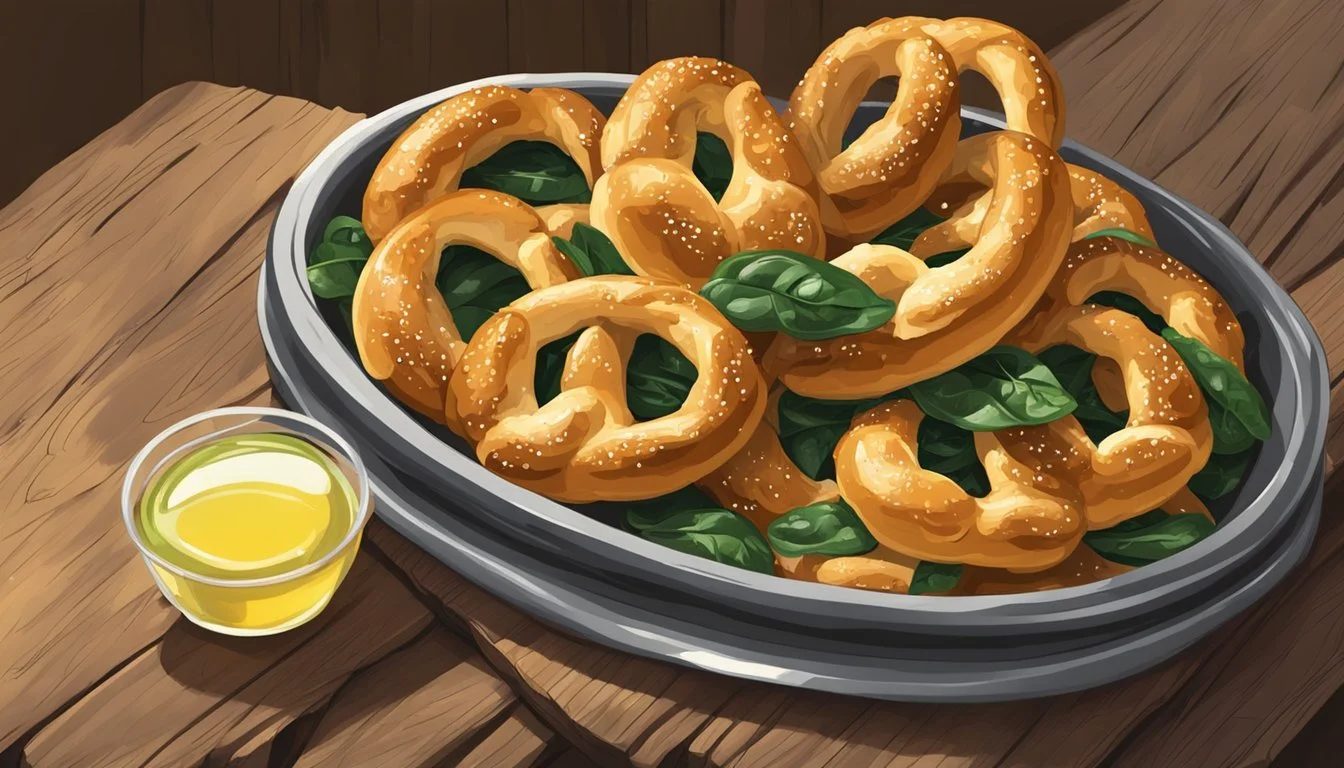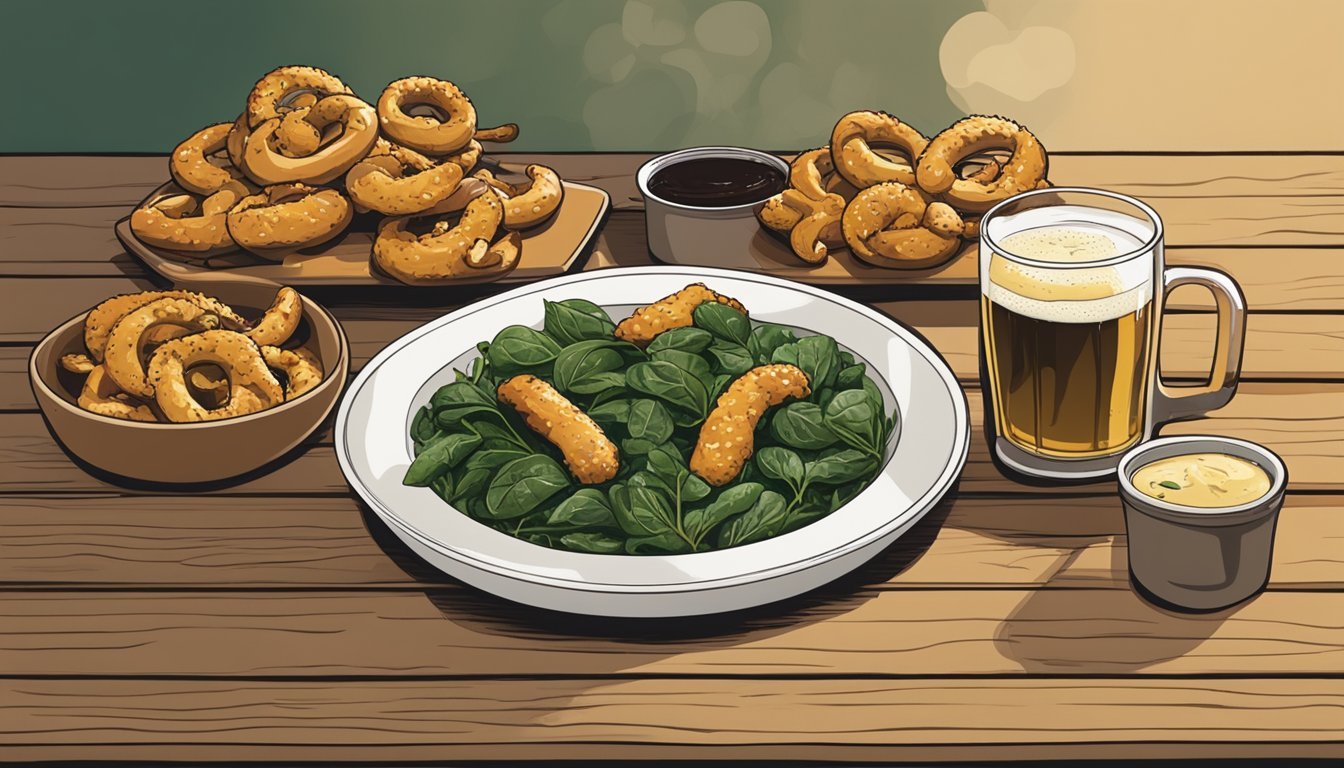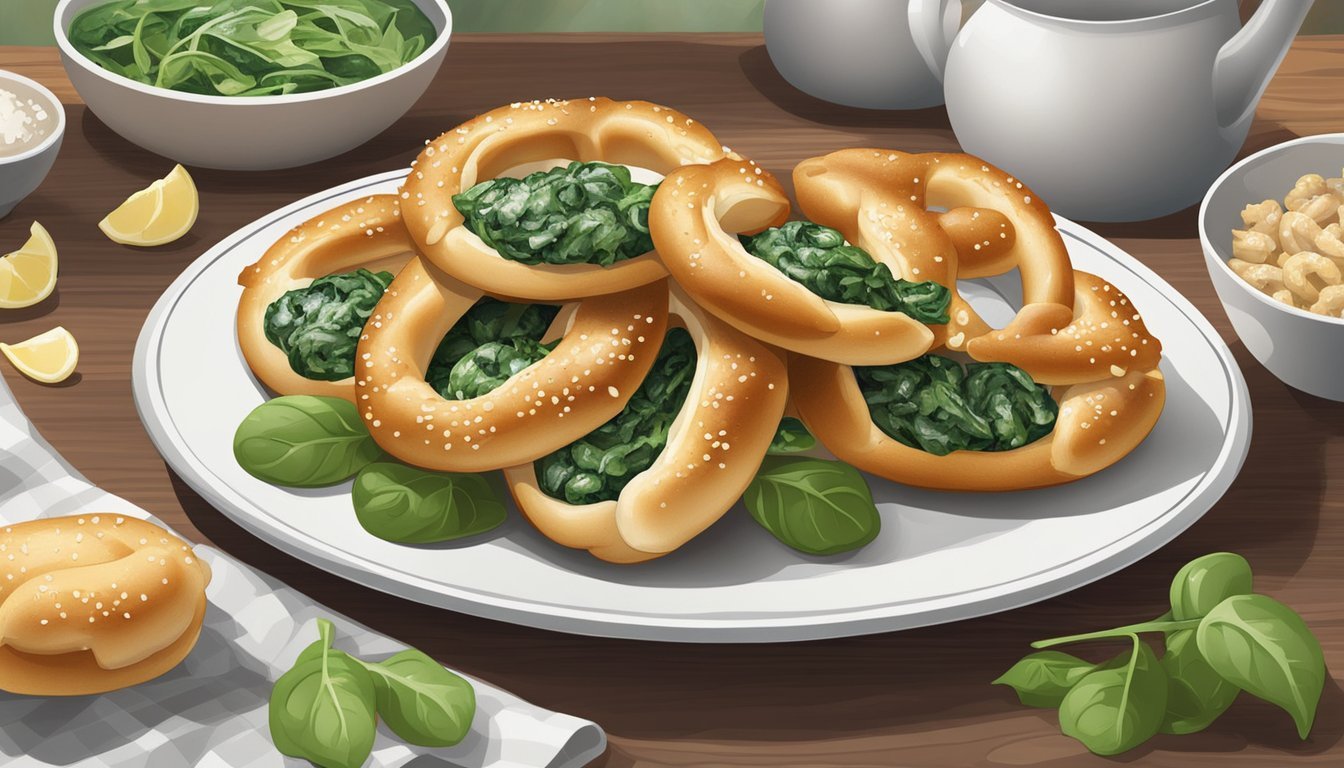How Long Do Chicken and Spinach Stuffed Pretzels Last?
Storage Tips and Safety Guidelines
Chicken and spinach stuffed pretzels are not only delicious but also pose a common question for those who love to meal prep: how long do they last? When stored properly, these homemade pretzels can remain fresh for up to three days in the refrigerator. For optimal freshness and taste, it's best to consume them within this time frame.
To maximize shelf life, keep the pretzels in an airtight container to prevent them from drying out. If you'd like to enjoy them later, consider freezing them. Stored in the freezer, chicken and spinach stuffed pretzels can last for up to two months.
Proper storage techniques ensure that your homemade pretzels maintain their flavor and texture. Always reheat them thoroughly before consuming, as this maintains their delightful crispiness and warm filling.
Overview of Stuffed Pretzels
Stuffed pretzels are a versatile snack or appetizer that blend the chewy softness of pretzels with various delicious fillings.
Popular fillings include spinach and artichoke, cheese, meats like chicken, and even sweet options.
Soft pretzels are particularly well-suited for stuffing because of their tender dough, which can be easily molded around different ingredients.
Spinach and artichoke stuffed soft pretzels offer a savory, creamy filling that is both nutritious and indulgent. The combination of spinach, artichoke, and creamy cheese provides a rich taste experience.
When making stuffed pretzels, the dough is often rolled into rectangles and filled before being folded and sealed. Basic dough ingredients typically include flour, sugar, salt, yeast, and melted butter. Some recipes also call for milk or malt powder.
These stuffed snacks are usually boiled briefly before baking to achieve a distinctive soft texture and golden brown finish. Serving stuffed pretzels warm enhances their flavor and texture, making them an excellent choice for gatherings and parties.
Whether served as an appetizer or a hearty snack, stuffed pretzels bring a delightful twist to traditional soft pretzels, catering to a variety of taste preferences.
Ingredients and Recipe Nuances
Creating chicken and spinach stuffed pretzels involves a detailed consideration of ingredients and precise execution steps to ensure a balance of taste and texture.
Essential Ingredients
The recipe hinges on a well-chosen mix of components.
Dough Ingredients:
All-purpose flour
Active dry yeast mixed with warm water to activate
Sugar for slight sweetness
Salt for flavor balance
Melted butter to add richness
Filling Ingredients:
Cooked chicken: Provides protein and a robust savory flavor
Fresh spinach: Offers essential vitamins and a slight crunch
Artichoke hearts: Adds a distinct flavor
Cream cheese, mozzarella, and parmesan: Combine for a creamy, cheesy texture
Minced garlic and chopped onions: Enhance the filling’s overall taste
Additional Ingredients:
Baking soda: Used in the water bath for the dough before baking to give pretzels their distinctive texture
Egg for egg wash: Helps the pretzels brown nicely and adds a glossy finish
Recipe Execution
The recipe execution demands attention to detail throughout each step.
Mixing the Dough:
Combine the flour, sugar, salt, and yeast mixture.
Mixing can be done by hand but using a stand mixer with a dough hook attachment streamlines the process.
Once the dough is smooth, let it rise until doubled in size.
Preparing the Filling:
While the dough rises, cook the chicken and wilt the spinach.
Combine the chicken, spinach, and artichoke hearts with the cheeses, garlic, and onions in a bowl.
Ensure the filling is well-mixed to distribute the flavors evenly.
Forming Pretzels:
Divide the risen dough into equal portions and roll each into a rectangle.
Spread the filling along the dough and carefully roll it up.
Boil each pretzel briefly in a baking soda solution for a chewy texture.
Brush with egg wash and bake until golden brown.
By following these steps carefully, one achieves a perfectly balanced, flavorful, and textured stuffed pretzel.
The Baking Process
Creating chicken and spinach stuffed pretzels involves several crucial steps, including preparing the dough, perfectly forming and stuffing the pretzels, and achieving the ideal bake. Each phase requires attention to detail to ensure a tasty and visually appealing final product.
Preparing the Pretzel Dough
To start, combine active dry yeast with warm water and let it sit until foamy. This usually takes about 5 minutes. In a large bowl, mix all-purpose flour, salt, and a touch of sugar. Add melted butter and the yeast mixture, stirring until a dough forms.
Knead the dough on a lightly floured surface for 8-10 minutes. Kneading develops the gluten, giving the dough its elasticity. After kneading, allow the dough to rise in a warm place for about an hour or until it has doubled in size.
Forming and Stuffing Techniques
Divide the risen dough into equal portions, typically forming 8-10 balls. Using a rolling pin, roll each ball into a rectangle, approximately 11x3 inches in size.
Spread the chicken and spinach filling along the length of each rectangle. Fold the dough over the filling, pinching the edges to seal. Ensure the ends are tightly closed to prevent filling leakage during baking. Shape the sealed dough into a traditional pretzel form, or simply twist into logs, depending on preference.
Perfecting the Bake
Preheat the oven to 425°F (218°C). Prepare a pot of boiling water with dissolved baking soda. Dip each pretzel in the water for about 30 seconds; this creates the characteristic chewy crust. Place the pretzels on baking sheets lined with parchment paper.
Bake in the preheated oven for 12-15 minutes, or until the pretzels turn a deep golden brown. Keep an eye on the color to avoid over-baking. Remove from the oven and let them cool on a wire rack before serving.
Proper Storage and Shelf Life
Proper storage of chicken and spinach stuffed pretzels is crucial to maintain their freshness, quality, and safety. Key considerations include room temperature storage, refrigeration, and freezing.
Storing at Room Temperature
Chicken and spinach stuffed pretzels should be consumed within 2 hours if left at room temperature. Beyond this period, the risk of foodborne illnesses increases. Moisture and mold can develop rapidly, especially if the pretzels are not in an airtight container. Exposure to room temperature accelerates bacterial growth, leading to potential food poisoning.
Storage Tips:
Use an airtight container to minimize moisture.
Keep in a cool, dry place.
Do not store for more than a few hours to ensure the best quality and safety.
Refrigeration for Freshness
Refrigerating chicken and spinach stuffed pretzels extends their shelf life significantly. When stored at 40°F (4°C) or below, these pretzels can last up to 4 days. Refrigeration slows bacterial growth, keeping the pretzels fresher longer.
Steps to Refrigerate:
Place pretzels in an airtight container or wrap them tightly in plastic wrap.
Store on a middle or lower shelf to avoid temperature fluctuations.
Check for signs of mold or spoilage before consuming.
Proper refrigeration keeps the pretzels moist and reduces spoilage risk.
Freezing and Defrosting
Freezing extends the shelf life of chicken and spinach stuffed pretzels up to 2-3 months. This is ideal for longer-term storage and reduces waste. Pretzels should be tightly wrapped in aluminum foil or placed in freezer-safe bags to prevent freezer burn.
Freezing Steps:
Cool the pretzels completely before freezing.
Wrap each pretzel individually or arrange them in a single layer in freezer bags.
Label with the expiration date.
Defrosting Tips:
Thaw in the refrigerator overnight.
Reheat in the oven or microwave, ensuring the internal temperature reaches 165°F (74°C) to ensure safety.
Proper freezing and defrosting maintain the texture and flavor, ensuring a ready-to-eat snack when needed.
Serving Suggestions and Pairings
Chicken and spinach stuffed pretzels can be elevated with a variety of complementary sides and flavorful dips, making them suitable for casual gatherings or themed events. The following sections detail the best accompaniments and ideas for serving them at different occasions.
Accompaniments and Dips
Dips:
Spinach Dip: Enhance the spinach flavors with a creamy spinach dip.
Artichoke Dip: Pair with a tangy artichoke dip for an added dimension.
Cheese Dip: Consider a rich, melty cheese dip for a classic choice.
Sides:
Roasted Vegetables: Serve with a mix of roasted vegetables, such as asparagus or sweet potatoes.
Salads: Opt for a fresh green salad or a cucumber and watermelon feta salad.
Baking Breads: Add cheese-filled bread or garlic bread on the side.
Event-Themed Serving Ideas
Casual Parties:
Present as appetizers with a selection of dips and small side dishes.
Pair with iced tea or light cocktails for a refreshing combination.
Holiday Season:
Serve warm stuffed pretzels as part of a festive buffet spread.
Accompany with seasonal beverages like mulled wine or hot cocoa.
Summer Gatherings:
Offer alongside fresh salads like chickpea salad or red cabbage slaw.
Combine with fruit-based beverages such as lemonade or iced tea for a cool refreshment.
Health Considerations and Nutritional Value
Chicken and spinach stuffed pretzels offer a blend of flavors and nutritional benefits. These savory snacks typically combine the protein of chicken with the vitamins and minerals found in spinach, wrapped in a doughy pretzel exterior.
Nutritional Value Per Serving:
Calories: Approximately 300-400 calories (varies with recipe)
Protein: High due to chicken content
Fiber: Moderate from spinach
Spinach contributes essential vitamins such as Vitamin A, Vitamin C, and folate. It is also a good source of dietary fiber, aiding digestion.
Chicken is a lean protein source, offering essential amino acids needed for muscle repair and growth. It supports a balanced diet when integrated into snacks like pretzels.
Preservatives and Additives: Homemade versions generally contain fewer preservatives and additives compared to store-bought options. Creating these pretzels at home allows for healthier ingredient choices, reducing the intake of unnecessary chemicals.
Homemade vs. Store-bought:
Homemade: Typically fresher, with controlled ingredients.
Store-bought: May contain preservatives to extend shelf life.
Dietary Fiber: Significant as spinach provides fiber, which helps maintain digestive health and can aid in weight management.
Calories: These snacks can be calorie-dense. It's essential to balance portion sizes within daily calorie needs.
Healthy fats can be added by incorporating spinach, reducing the need for additional oils or butter in recipes. This balance aids in maintaining a nutrient-rich diet without excessive calorie intake.
Ultimately, chicken and spinach stuffed pretzels can be a nutritious option when prepared with mindful ingredient choices, free from excessive preservatives and additives.
Interactive Engagement and Sharing
Sharing delicious recipes, like chicken and spinach stuffed pretzels, on social media platforms is a great way to engage with others. Platforms such as Instagram, Facebook, and Pinterest allow users to showcase their culinary creations with visually appealing photos and detailed descriptions.
On Instagram, individuals can post pictures and short video clips of their stuffed pretzels.
Using relevant hashtags like #StuffedPretzels or #HomemadeSnacks can help increase visibility. Engaging with followers through comments and stories adds a personal touch, fostering a sense of community.
In Facebook groups dedicated to cooking and baking, individuals can share their recipes and finished products. Posting step-by-step photos or even live cooking sessions can generate interactive discussions and provide helpful tips for others trying the recipe.
Pinterest is ideal for curating and discovering new recipes. Users can pin their chicken and spinach stuffed pretzel recipes to themed boards for others to find. High-quality images and succinct descriptions are key to attracting attention.
Encouraging others to share their own attempts at making stuffed pretzels can create a dynamic and engaged audience. Utilizing features like polls, Q&A sessions, or recipe challenges can further enhance interaction.
Creating a sense of community through shared culinary experiences not only makes the process enjoyable but also inspires others to explore their culinary creativity. Engaging through these platforms can turn a simple recipe into a collaborative and interactive experience shared by many.








